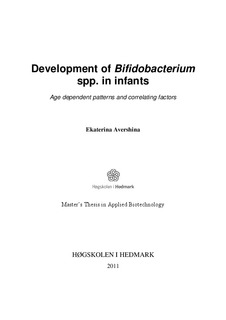Development of Bifidobacterium spp. in infants: Age dependent patterns and correlating factors
Master thesis
Permanent lenke
http://hdl.handle.net/11250/132345Utgivelsesdato
2011Metadata
Vis full innførselSammendrag
Bifidobacteria are a major microbial component of infant gut microbiota which is believed to
promote health benefits for the host and stimulate the maturation of immune system. Despite
the importance we know little about the natural development of bifidobacteria in the infant
gut. To address this question, we analyzed mixed Bifidobacterium clpC gene sequences from
IMPACT (Immunology and Microbiology in Prevention of Allergy among Children in
Trondheim) stool samples of 83 infants and their mothers using the novel multivariate
statistical MCR-ALS approach. We also developed a novel basecaller script in MATLAB®
environment which simplifies the use of the MCR-ALS method so that manual decoding is no
longer required. Faecal material was sampled during the first and the second part of
pregnancy, at 3 days, 10 days, 4 months, 1 year and 2 years after birth. Five dominant
Bifidobacterium species were identified and verified by cloning. Stool samples were predicted
to be rich in B. adolescentis, B. bifidum, B. dentium, B. breve and B. longum species. The B.
longum group consisted of B. longum longum irrespective of age, however B. longum infantis
was mostly identified in four-month-old individuals indicating a potential infant-to-infant
nature of its transmittance. Local Similarity Analysis revealed self-supportive correlations
between Bifidobacterium, Lactobacillales, Clostridium, Proteobacteria and other bacterial
groups. The amount of B. breve in infants correlated with the incidence of common cold
infections during pregnancy. Development of all Bifidobacterium and B. longum groups had
correlation to the occurrence of vaginal fungal infection during pregnancy. Elevated amounts
of B. adolescentis in four-month-old infants correlated to high IgE levels and eczema
symptoms, while levels of the B. longum group in infants – to eczema. In conclusion, new
patterns in bifidobacterial development and interaction are described. We believe this new
knowledge will be important for the future understanding of bifidobacteria in health and
disease.
Beskrivelse
Mastergradsoppgave i næringsrettet bioteknologi, Avdeling for lærerutdanning og naturvitenskap, Høgskolen i Hedmark, 2011. Master of applied and commercial biotechnology.
